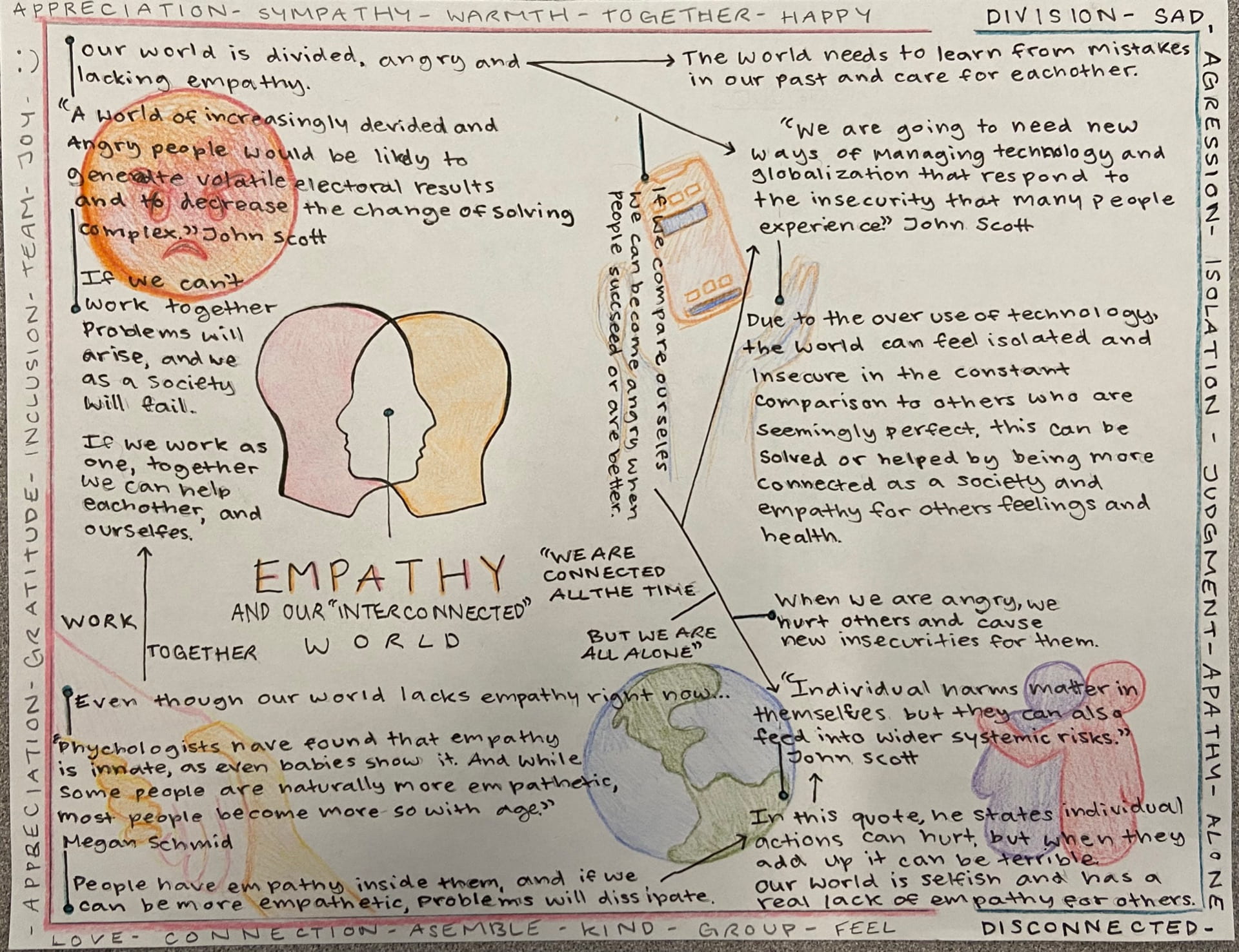New Media 11 Challenge – Summative Assignment
How does the process of minimizing polarization and moving past the Single Story begin with me?
In our growing and evolving world, division is a prominent topic, blanketing lots of pressing issues many groups of people are experiencing, and some of us unaware of the impact polarization is making.

This week our New Media 11 class reviewed and analyzed some articles and materials focused on biases, hate, assumptions, single stories, and polarization.
Following and covering the ideas of bias’s opinions and assumptions is a Ted Talk by Chimananda Ngozi Adichie, Adichie’s Ted Talk “The Dangers of a Single Story,” talked about her experiences with ‘single stories’. Her talk covered her journey as a writer who grew up in Nigeria. Like most, her childhood was surrounded by society’s influences and stereotypes. She presented that, single stories are very biased, not because others are trying to cause hate and issue, but only because their brain subconsciously makes these biased assumptions. This is because of their own knowledge and surroundings.
Single stories are incomplete, thus the use of the word single. A group of people cannot be described with one story, a single story, they would need many more opportunities to tell their many stories, creating the intricate group or persons that they are. Without these many stories, an outsider to the group will have a biased story.
In her speech, Adichie spoke about power, “It is the ability not just to tell the story of another person, but to make it the definitive story of that person,” meaning that if someone has power, they can make others believe whatever they say, truth or not, their power will make a bias opinion grow and develop.

I believe honesty in oneself is important, one must put aside pride and personal opinions, and listen. Listening and being open to other stories and ways of doing things, will help us realize our connection with others and why we need the whole truth. The stories we have made, may be incomplete, and to fully understand and embrace the truth, we must make our stories complete and whole.
By learning about other’s stories, we can connect with them, like in the second article reviewed; a YouTube video by Michael Wesch. His journey can be followed on YouTube, Wesch had decided to challenge himself by leaving his city life and stepping into his sisters’ shoes. More
specifically, Wesch’s’ challenge was to learn to like, or at least to stop hating, country music and dancing. Learning to stop hating something, helped him discover the connection and depth of the thing he once hated and how it could bring him closer others.
After learning about and analyzing Wesch’s experience and growth, in-depth discussion about topics like, stereotypes, assumptions, prejudice opinions and categorization rise to the surface natural, and lots can be leant. Wesch had learned to empathize and understand why his sister loved what she did. The class as a whole did not only learn what stereotypes are, but learnt what they can be hurtful, and why it is important to look past them with an open mind, looking to debunk the assumptions.
Learning about whole stories and assumptions is what took us to our final activity; The New Media 11 Challenge, like Wesch’s challenge, the goal is to better understand others by listening to not only their single story but their whole truth without assumptions or stereotypes. This being a great way to start debunking our own single stories and listening, truly, and open heartedly listening to the other persons stories and experience, that make them who they are today.

We were paired up with someone in the class we may not know well, or haven’t talked to before, and following some structured questions, and some not so much, we shared our thoughts. We discussed the normalization of otherness and why single stories are connected to this as well as how they can help us look past things like them.
Personally, this topic in New Media 11 is all about the division our world is facing right now, the word division is what best describes and blankets the issues today. The lack of empathy, single story representation, lack of critical thinking and overall lack of effort, make it hard to seek truth and whole stories.
Thinking about a way I could connect this to other subjects that surfaced in this class, I realized that these problems can be connected to something we all overly use; our phones. In world where we are always on our phones and devices, we are divided into several groups isolating each other, the news is broken: it’s no longer a trustworthy source like in the past, and half the time, the website you’re using is full of CRAAP. How vulnerable are to Fake News and single stories, and why are media’s using their power to push bias opinions EVERYWHERE!
“How does the process of minimizing polarization and moving past the Single Story begin with me?” It’s a question bigger than one answer, pondering on it, made me realize how much hate and judgment there is in the world, and with that comes one big problematic issue. The atmosphere of hate is everywhere, and though one person can learn to like country music, and listen to other people’s truths, does not mean they fixed the whole world. But what they did do was lighten someone’s day, show they care and helped debunk at least one single story. With this they made their world a better place, and if we could all listen to one whole truth and learn to like something new, there would be no problem.

